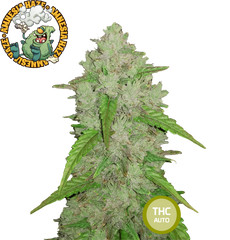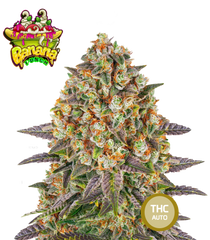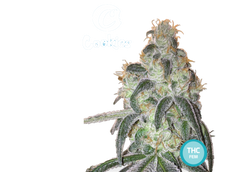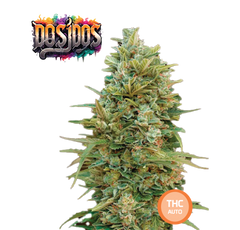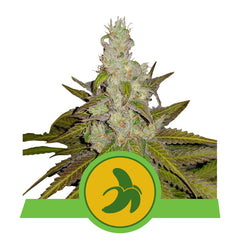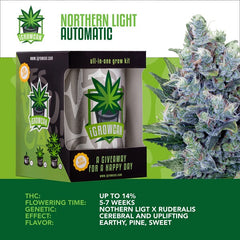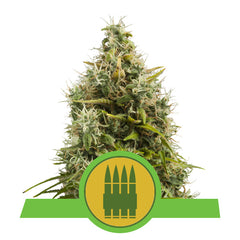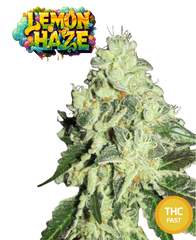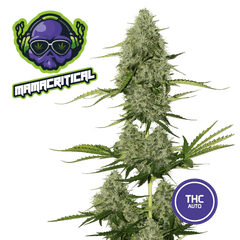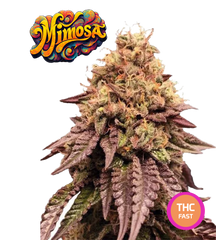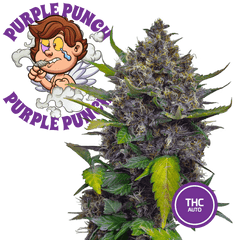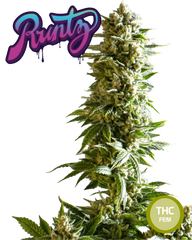The benefits of organic foods are increasingly evident, both for health and for the environment, almost becoming a form of resistance to mass cultivation. So why not replicate this approach for the cultivation of our "little girls" too?
Fruit and vegetables coming from intensive cultivation, which use very low-cost products, forced to grow in a very short time, entail a whole series of disadvantages. In fact, harmful pesticides are often used which cause damage to the health of consumers. Even on an organoleptic level they prove to be poor: the perfect aesthetic appearance often hides an almost non-existent flavor and poor nutritional values. Furthermore, this type of "industrial" cultivation creates inestimable damage to the environment: pollution and over-use of land, pollution of aquifers and air, water waste and much more.
Chemical fertilizers, pesticides and fungicides are not only used for food, but also for growing cannabis, causing the same harmful effects as it is smoked and ingested. Surprisingly, organic cannabis cultivation is a fairly recent concept.
THE HISTORY OF ORGANIC CULTIVATION
Humans have grown cannabis for millennia, and until recently, not much was known about it. It was a particularly resistant and flexible plant species, which can grow wherever it finds a climate favorable to its development: from the mountain rangesof Afghanistan to the sunny skies of California.
Things changed with the ban at the beginning of the 20th century, and with the start of America's "war on drugs" in the early 1970s, the situation became even more dire. This has caused a stigmatization of this cultivar, with a consequent reduction in the variety, quality and quantity produced. To overcome this drawback, chemical fertilizers have started to be used to maximize yields. This, as often happens, caused a chain reaction of negative effects: + pesticides = + diseases = + parasites = + pesticides and so on.
TODAY
The situation has profoundly changed, finally. We don't just pay attention to the yield, but also and above all to the quality and aromatic spectrum of the plant, as well as the potential damage to health caused by chemical products. Times have changed. People have realized that productivity is not the only important factor when growing cannabis. The cannabis crop/culture has therefore found a perfect union with the organic one, producing incredible offspring!
WHAT IS ORGANIC CANNABIS?
The concept of growing cannabis organically was strongly pushed by Jeff Lowenfels , a Harvard-educated Alaskan lawyer and avid grower. This, in fact, promoted that organic cultivation could satisfy the food chain of the entire natural life cycle of plants and microorganisms present in the soil. This chain preserves a complex living system present underground and its interaction with the environment, plants and animals.
A good example frequently used by farmers since the beginning of time is to leave fallen leaves in order to naturally fertilize the land in spring. The principle is to keep things as natural as possible , reducing human intervention to a minimum.
MICROORGANISMS AND THEIR IMPORTANT ROLE IN ORGANIC CROPS
Microorganisms that live underground play a very important role in organic crops, helping to produce nutrients for plants through the synthesis of residues and other soil elements . This natural process has two benefits: the organisms help fertilize the plants, while eliminating potentially harmful residues .
In conventional crops with synthetic fertilizers, the nutrients are directly assimilated by the plants. In organic crops, however, the measures adopted have the aim of conditioning the soil to facilitate the development of microorganisms, naturally stimulating the growth of plants.
HOW TO GROW CANNABIS ORGANICLY
Before finding out how to grow cannabis organically, some clarifications need to be made.
Indoor cultivation cannot take advantage of a "natural cycle" being confined to an enclosed space. For example, when a pest infestation occurs in an indoor grow, natural predators will never be able to intervene. In these cases, the grower will have to use certain treatments if he does not want to lose the entire harvest. The thing that an indoor grower can do is use natural fertilizers and pesticides (such as the excellent Italian brand Biomagno ), in full compliance with the principles of organic farming.
ORGANIC CANNABIS MUST GROW IN A NATURAL SUBSTRATE
Returning to the subsoil, the first step to grow organically is to use naturally processed soil: it is essential to create the optimal environment for microorganisms, which will help provide nutrients to the plants. The best types of organic soil are mixtures of compost , earthworm humus (or vermicompost ), perlite, seaweed meal , bat guano , pumice , fish-based emulsions , peat moss and other compounds present in different proportions.
For those who have never grown organically, two possible paths open up. First, purchase all the ingredients to add separately and mix them according to one
recipe for making organic soil (compost, vermicompost etc...). Or, purchase pre-mixed "super-soils" from specialty growing stores. This is the most recommended if you are new to organic growing, as pre-mixed media requires much less maintenance. In these cases, the grower will only have to add the correct quantities of water, ensuring that the soil (i.e. the microorganisms contained in it) will take care of everything else.
The soil mix is probably the most important part of an organic cannabis grow, but there are other factors. Some organic growers argue that the entire growing environment should be set up as a single ecosystem, maintaining a healthy balance between soil, temperature , humidity, air flow, lamps etc. Since all these factors influence each other, it will be necessary to look at the entire ecosystem.
FERTILIZERS IN ORGANIC CANNABIS GROWING
The nutrients assimilated by your plants will be produced by the microorganisms present in the subsoil, which means that you will not have to add other nutrients or food supplements and you will not have to intervene on the crops. Simply put: you will need the right amount of water.
However, cannabis growers can today find numerous organic farming products with which to boost the growth of girls. Most organic cannabis growers use "compost teas", particular fertilizing mixtures that offer multiple advantages, such as supporting subsoil microorganisms and keeping diseases at bay. By doing a quick search on the internet you will find several recipes for making excellent " compost tea " from which you can derive enormous benefits.
MYCORRHIZAL FUNGI ARE A POWERFUL NATURAL STIMULATOR FOR PLANT GROWTH
Adding mycorrhizal fungi to organic soil can be another valid natural alternative to stimulate plant growth. These fungi establish a symbiotic relationship with plants, increasing their ability to assimilate nutrients and water. Some organic fertilizers sold commercially already contain mycorrhizal fungi, but they can also be purchased separately. Introducing these organisms into the soil offers great benefits throughout the entire plant development cycle.
BIOLOGICAL PARASITE CONTROL
When growing cannabis, especially outdoors, the most frequent parasites can be eradicated without the use of synthetic insecticides. Natural solutions can be just as effective at managing pests and contain no chemicals.
To combat some families of aphids, such as red spider mites and other common parasites, foliar products with neem oil can be used , the effectiveness of which is now recognised. Bacillus thuringiensis is another biological remedy that can eradicate soil gnats , mosquitoes and some lapidoptera larvae.
COMPANION PLANTING KEEPS PARASITES AWAY
If you have large cultivation surfaces, still talking about outdoors, intercropping is another method to control parasites in a natural and organic way. This agricultural practice consists of planting nearby plants with natural repellent properties. Aphids don't like the presence of marigold , while basil and dill keep soil midges away. For almost every common pest there is a corresponding repellent plant. We therefore recommend a brief internet search depending on the case, which can provide useful detailed information.
WHY SHOULD I GROW CANNABIS ORGANICLY?
In addition to the above issues regarding crop quality and related potential health problems, this could trigger nutrient lockout caused by the overuse of chemicals that accumulate in the soil which, in turn, can trigger nutritional deficiencies in plants. . These are quite common among novice growers.
Organic cultivation does not involve risks as the nutrients are not supplied directly to the plants, but, on the contrary, they feed microorganisms that are positive for the plants. This is why it is rather unlikely that overfertilization occurs in an organic crop. Furthermore, you will no longer have to worry about the pH of the water or fertilizer solutions, as organic soil is more "resistant" to such changes.
With chemical fertilizers, almost 90% of nutrients are lost. in fact, only a small percentage is assimilated by the plants, while the rest spreads into the substrate through irrigation. Most popular all-purpose potting mixes run out of nutrients over time, which means they need to be replaced every cycle. An organic mix can be “refreshed” each season with the addition of mycorrhizal fungi , which also produces a greater economy.
No less important is the result: supporters of organic cannabis consider the quality of the final buds to be significantly higher, larger and more aromatic, thanks to the absence of chemical substances. If you enjoy growing cannabis, consider organic cultivation as a more sustainable alternative.



